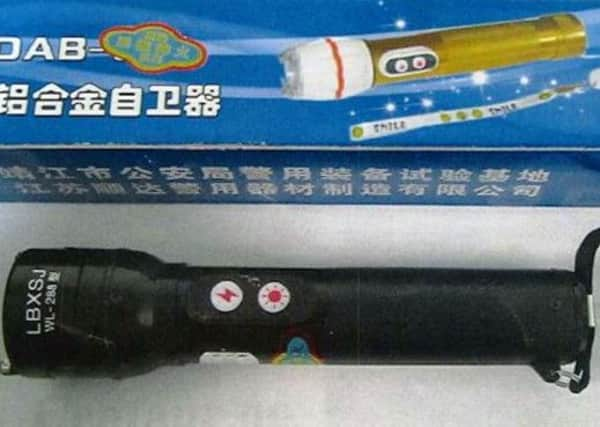East Preston man jailed for importing stun guns


Aaron Davies, of Sea Road, was sentenced at Chichester Crown Court on Friday (January 9) having been found guilty following a trial which ended the day before.
The 30-year-old was convicted of importing prohibited weapons, 22 stun guns disguised as torches, into the country with intent to evade a prohibition, and with possession of them.
Advertisement
Hide AdAdvertisement
Hide AdDavies was also sentenced to an additional nine months in prison for separate counterfeit goods offences, bringing his total prison sentence to six years and three months.


Stun guns are prohibited weapons and contrary to Section 5 of the Firearms Act 1968.
The devices are not the same as taser devices used by police forces in the UK.
They are more powerful and have no legitimate use in this country.
Advertisement
Hide AdAdvertisement
Hide AdDetective Inspector Till Sanderson said; “These devices are very powerful and dangerous. Anyone who has information about someone offering them for sale, or possessing some should contact police via 101.”
The prosecution followed an investigation in which Davies’ home address and his work place – a business unit at the Rudford Industrial Estate in Ford – were searched by officers in May 2013.
However, the investigation began a month earlier when Border Agency staff at Coventry intercepted a Parcelforce parcel originating from China.
The customs declaration listed the contents as ‘Flashlight 7’ but when they opened the package they discovered seven boxes each containing a stun gun device disguised as a torch.
Advertisement
Hide AdAdvertisement
Hide AdThe parcel was destined for Davies’ work address at Ford, Bulldog Enterprise Ltd, and on May 1, 2013, detectives searched the site and arrested him.
His business dealt with electrical goods such as toys, car sales, as well as valeting. He would bulk purchase items and try and sell on for profit.
The search uncovered 13 identical stun guns hidden in the suspended ceiling void. In his car were found two more boxed stun guns hidden in the spare tyre void in the boot.
Davies’ work computer was seized and evidence obtained showing that he had been actively tracking parcels en-route to him from China, including the parcel that had been intercepted the previous month.
Advertisement
Hide AdAdvertisement
Hide AdAlso seized during the search were various counterfeit goods that he was selling or intending to sell on eBay.
Davies had previously had numerous eBay accounts suspended resulting from his selling activities and outstanding debts over goods and payments.
He admitted that he had looked at various methods of circumventing his ban from eBay so he could continue to do business on the site, police said.
At a previous separate hearing he pleaded guilty to ten counterfeit goods offences.
Advertisement
Hide AdAdvertisement
Hide AdWest Sussex Trading Standards launched a joint investigation into the counterfeit goods with Sussex Police.
Davies had been selling fake Beats headphones, Links of London watches, fake designer clothes and counterfeit Mulberry handbags over eBay.
Lionel Barnard, West Sussex County Council’s member for residents’ services with responsibility for Trading Standards, said: “This is good news for consumers and businesses.
“These criminal activities severely damage the local economy and legitimate traders by gaining a competitive advantage at their expense, and taking trade away from genuine hard-working businesses.
Advertisement
Hide AdAdvertisement
Hide Ad“We are extremely pleased with the outcome of this complex investigation. The case sends out a clear message that it’s unacceptable to defraud the public into parting with their money for goods that are anything other than genuine.”